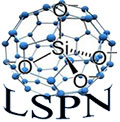Equipe 04 : Caractérisation des Matériaux, Modélisation et Simulation de leur Comportement (CMMSC)
RESEARCH TEAM NO.04: CHARACTERIZATION OF MATERIALS, MODELLING AND SIMULATION OF THEIR BEHAVIOUR
- Team Leader:Prof. LAHIOUEL Yasmina
- The team’s scientific objectives are to develop the following lines of research:
- A computer-based approach to the study and characterization of the physico-chemical and thermodynamic properties of petroleum fractions using group contribution method, genetic algorithms, and MLP-ANN (multi-layer perceptron artificial neural network): Numerical models are developed tested and validated for different physical, chemical and thermodynamic properties of oil fractions, which play an important role in the design and operation of almost all petroleum industry equipment. In processes, these data must be known in order to improve equipment efficiency and optimize time and energy consumption and thereby minimize production costs. The calculation of the properties of a mixture depends on the properties of its constituents. Therefore, the characterization of petroleum fractions and crude oils depends on the characterization and properties of pure components. Some physical properties of mixtures are easily measurable, such as density, while other properties such as critical properties and vaporization enthalpy cannot be easily measured.
- Study of the quality and stability of drinking water distributed to consumers in transport networks: We study the effects of simulated pressure shocks on the water quality with online analyzers. The distribution of drinking water generates soft deposits and biofilms in the pipelines of distribution systems. Disturbances in water distribution can detach these deposits and biofilms and thus deteriorate the water quality.
- Modeling, Simulation and Optimization of fluid distribution and transportation Systems:The design of oil, water and gas distribution systems, irrigation systems, and telecommunication and electricity grids, involves cost and reliability optimization. The search for the mesh layout of the systems is the essential objective using a number of algorithms for the design of the distribution and transport networks to choose the one most appropriate to the reality in Algeria. This step is followed by modeling and simulation of the flow behavior in the network. The simulation concerns the flow rates and pressures in the pipes, as well as a management of the inclusion of pumps and other accessories units;treatment including aeration, projection, sedimentation, filtration and disinfection;distribution including the delivery and proper distribution of tanks, pipes, valves etc. A modern fluid distribution system should essentially include facilities for collection and storage, transport, pumping, treatment and distribution.
- Material characterization, process simulation and composite manufacturing optimization: This work focuses on the development of a virtual material for the simulation and optimization of heterogeneous microstructure materials, in particular new-generation ceramic matrix composites. Thus a modeling using a discrete method is planned to do this. Another objective is the synthesis and characterization of ionogels based on silica/ ionic liquid (butyl-3-methylimidazolium tetrafluoroborate (BMIMBF4)) and the study of the inhibitory action of ionic liquids (ethyl-3-methylimidazolium acetate (EMIMAC), butyl-3-methylimidazolium tetrafluoroborate (BMIMBF4) on the corrosion of steels in HCl 1 M.
- Members of the team
1. LAHIOUEL Yasmina, Professor, Génie des Procédés.
2. BENGOURNA Nadjette, MCB, Génie des Matériaux,
3. BELGHIT Chafik, MAA, Génie Chimique,
4. BEDDIAF Souad, phD student,
5. ROUBEHIE FISSA Mohamed, phD student.

